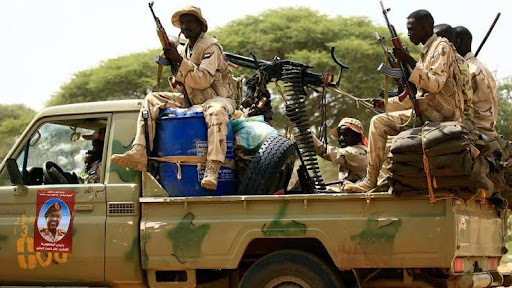Sudan: Warning Over Critical Lack Of Doctors As Fighting Enters Third Day
Around a hundred people have been killed and many more have been injured since fighting erupted in Sudan. There is a serious lack of medical staff to aid casualties in the country, UN health authorities say.

There is a critical lack of doctors, nurses and other medical personnel in Sudan as the country erupts in conflict, the World Health Organization (WHO) has warned.
Fighting between the Sudanese Armed Forces (SAF) and its paramilitary Rapid Support Forces (RSF) has killed nearly a hundred civilians and injured many others, the United Nation’s health organisation said.
“The doctors, medical personnel, and the entire healthcare sector face great difficulties and problems in Khartoum because there is no security,” a WHO spokesman said on Sunday.
Doctors in Sudan have cautioned that the situation in Khartoum hospitals is extremely tough, with fighting preventing both staff and medical supplies from reaching injured patients.
Many companies and organisations have already announced their intention to cease operations. The World Food Program (WFP), and Qatar Airways, have all declared temporary halts to their operations in Sudan.
The WFP stated that it was “heartbroken” by the news of the deaths of its three employees, and that one of its planes had been damaged at Khartoum International Airport during an exchange of gunfire on Saturday, limiting its ability to supply supplies.
“WFP is committed to assisting the Sudanese people facing dire food insecurity, but we cannot do our lifesaving work if the safety and security of our teams and partners is not guaranteed,” the statement said.
Power struggle
The combat in Sudan began on Saturday, April 15, when Sudanese Armed Forces (SAF) commander, Abdel Fattah al-Burhan, and the paramilitary Rapid Support Forces (RSF) chief, Mohamed Hamdan Dagalo (Hemedti), clashed near a military base in Sudan’s capital, Khartoum.
The two military chiefs have been embroiled in a power struggle since they collaborated to depose Sudanese President Omar al-Bashir in 2019 and played a key part in the military coup in 2021, which ended a power-sharing arrangement between the military and civilian factions.
However, disagreements over how to incorporate the RSF into the Sudanese military and the standing of its heads prior to the transfer to civilian control have caused a severe schism between SAF and RSF.
Residents in Khartoum awoke Monday April 17 to the sounds of artillery and warplane bombing, as fierce fighting continued despite a UN-brokered truce agreement reached on Sunday.
Some residents told Reuters that they have not slept for 24 hours as they were trapped inside their homes with houses shaking and the sounds of bombs and gunfire.
“We’re scared, we haven’t slept for 24 hours because of the noise and the house shaking,” Huda, a Khartoum resident, told the news agency. “We’re worried about running out of water and food, and medicine for my diabetic father.”
As foreign countries prepare to evacuate their citizens, the RSF has taken control of Khartoum’s airport and numerous other government buildings. SAF has also asserted authority over other critical locations and said it’s regaining control of some areas controlled by the RSF.
RSF members remained inside Khartoum international airport besieged by the army but it was holding back from striking them to avoid wreaking major damage, witnesses told Reuters.
Support Our Journalism
There are millions of ordinary people affected by conflict in Africa whose stories are missing in the mainstream media. HumAngle is determined to tell those challenging and under-reported stories, hoping that the people impacted by these conflicts will find the safety and security they deserve.
To ensure that we continue to provide public service coverage, we have a small favour to ask you. We want you to be part of our journalistic endeavour by contributing a token to us.
Your donation will further promote a robust, free, and independent media.
Donate HereStay Closer To The Stories That Matter




